The coronavirus outbreak and the development of COVID-19 vaccines have placed science news in the spotlight. Hispanic Americans report broad engagement with coronavirus news and information and smaller shares have engaged with science news generally.
Nearly half of Hispanic adults (47%) say, when the survey was fielded in December 2021, they were talking about the coronavirus outbreak and vaccines nearly every day or a few times a week; another 25% say they were talking about it at least a few times a month. Nearly three-quarters of Hispanic social media users (73%) reported having seen content about the outbreak in recent weeks. Engagement with coronavirus news and information on these measures is roughly on par with levels of engagement among all U.S. adults.
When it comes to who Hispanic Americans feel they can turn to for coronavirus information, a large majority (74%) say they can rely a lot or some on information from experts about the outbreak and vaccines. The survey also highlights the important role friends and family play: 58% of Hispanic adults say they can rely at least some on close friends and family for information about the coronavirus outbreak and vaccines.
There are differences among Hispanic adults by partisanship when it comes to news and information about the coronavirus outbreak. Republican and Republican-leaning Hispanic adults are much less likely than Democrats and Democratic leaners to say they can rely on experts for coronavirus information.
In assessing information about the coronavirus outbreak, the most widely held reaction by Hispanic adults – expressed by majorities of both Republicans and Democrats – is having felt frustrated that there is so much political disagreement in this area. The challenge of interpreting coronavirus news and information is also apparent: Majorities of Hispanic adults report having felt reassured that understanding in this area is always being updated and report having found it difficult to know what to think because there is so much conflicting information.
When it comes to science news generally, 24% of Hispanic adults say they are very interested in following news about science. Interest in science news is especially strong among Hispanic adults with a postgraduate degree and those with higher family incomes.
Nearly three-quarters of Hispanic adults on social media have seen COVID-19-related content there
Among Hispanic Americans, about half (47%) say they discussed news about the coronavirus outbreak and vaccines nearly every day or a few times a week in December 2021, when the survey was fielded. A quarter say they talked about the outbreak a few times a month and the same share (25%) say they talked about it less often than that. Hispanic adults were about as likely as all U.S. adults to say they were talking about the coronavirus outbreak and vaccines late last year.
Among Hispanic social media users, a majority (73%) report seeing content related to the coronavirus outbreak and vaccines on social media within the past few weeks. This is about the same as the 68% of all U.S. adult social media users who say they have seen this type of content recently. About a quarter (27%) of Hispanic social media users say they follow a page or account that focuses on information about the coronavirus outbreak.
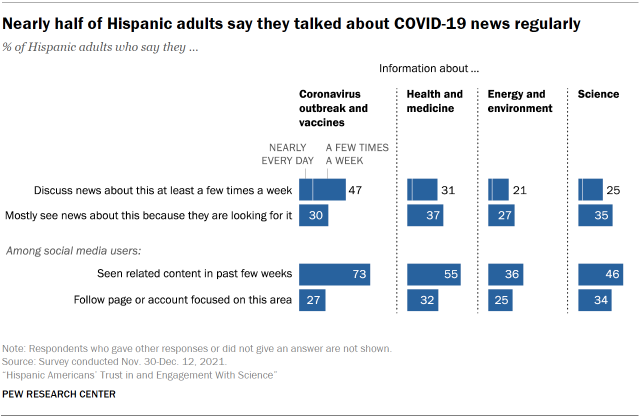
Younger Hispanic social media users ages 18 to 49 are more likely to have seen content related to the coronavirus outbreak and vaccines on social media than older users ages 50 and older (75% vs. 66%). However, similar shares of Hispanic social media users across age groups report following a page or account focused on coronavirus content.
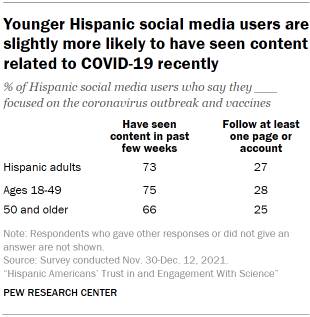
When it comes to news about the coronavirus outbreak and vaccines, Hispanic adults are much more likely to say they primarily see this type of news because they happen to come across it (69%) rather than to say that they are actively seeking it out (30%).
COVID-19 news often highlighted the direct relevance of science information for people’s lives. One focus group participant explained his reasons for paying attention to news about the coronavirus outbreak and vaccines as follows:
“It’s very important for my health because of my family and those around me. For example, I heard that Pfizer wanted to apply a third dose, you have to be vigilant because if you have that and there is a third vaccine you have to be aware of that.” – Hispanic man, age 40-65
By comparison, Hispanic adults report discussing other science-related topics much less often than the coronavirus outbreak. Overall, 31% say they discussed news about health and medicine at least a few times a week, while 25% say this about science topics generally and 21% say this about energy and environment news.
The share of Hispanic adults who report talking about science news at least a few times a week is slightly higher than in a 2017 Center survey (25% vs. 20%). However, the share of Hispanic social media users saying they follow a page or account related to science is about the same as it was in 2017 (34% vs. 31%). The share of Hispanic adults who report being very interested in science news is also about the same as it was in 2017 (24% vs. 26%).
Majorities of Hispanic Americans say they can rely at least some on experts along with close family and friends for COVID-19 information
When asked about which sources they can rely on for information about the coronavirus outbreak, experts top the list of sources for Hispanic Americans, followed by close friends and family.
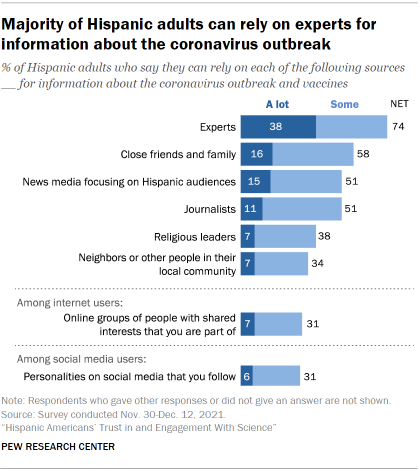
A majority (74%) of Hispanic adults say they can rely either a lot or some on information from experts about the coronavirus and vaccines.
More than half (58%) say they can rely on close friends and family for this type of information. The shares of Hispanic adults who rely on experts and on friends and family for information about the coronavirus and vaccines are similar to those among all U.S. adults.
Overall, 51% of Hispanic adults say they can rely on journalists a lot or some for coronavirus information; the same share (51%) say they can turn to news media that focuses specifically on Hispanic audiences.
Fewer say they can rely at least some on religious leaders (38%) and neighbors or people in their local community (34%) for information about the coronavirus outbreak and vaccines.
Among Hispanic internet users, 31% say they can rely a lot or some on online interest groups they are a part of for coronavirus information. Among Hispanic social media users, 31% say they can rely at least some on personalities on social media that they follow for news about the outbreak and vaccines.
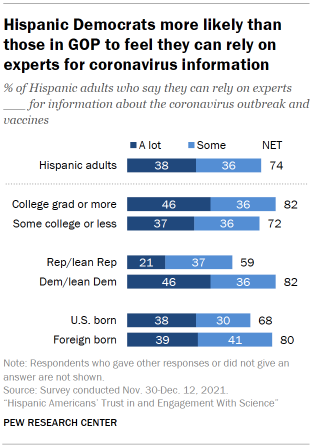
There are significant differences by partisan affiliation when it comes to people’s sense that they can rely on experts for coronavirus news and information. Hispanic adults who identify with or lean toward the Democratic Party are much more likely to say they can rely at least some on experts than are Hispanics who identify with or lean toward the Republican Party (82% to 59%). This gap mirrors the one seen among all U.S. adults.
Across levels of educational attainment, a larger majority of Hispanic adults with a college degree or more (82%) than those who have not completed college (72%) say they can rely at least some on experts for information about the coronavirus outbreak and vaccines.
Foreign-born Hispanic adults are somewhat more likely than those born in the U.S. to say they can rely on experts for coronavirus information (80% to 68%).
Hispanic Americans report a mix of reactions to COVID-19 news
In following information about the coronavirus outbreak and vaccines, 69% of Hispanic adults say they have felt frustrated that there is so much political disagreement in this area.
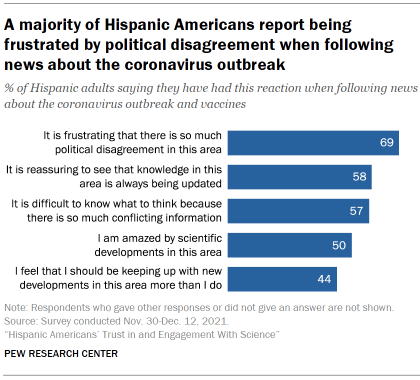
Hispanic adults report a mix of other reactions to coronavirus news, ranging from reassurance to difficulty making sense of conflicting information.
About six-in-ten Latinos (58%) say it is reassuring to see that knowledge about the outbreak and vaccines is always being updated. Yet about the same percentage (57%) say they’ve felt that it is difficult to know what to think about the coronavirus outbreak and vaccines because there is so much conflicting information.
These mixed sentiments are shared among the entire U.S. adult population: 56% say that it is reassuring to see knowledge being updated, while 62% say it’s difficult to know what to think because of so much conflicting information.
Half of Latinos say information about the coronavirus outbreak and vaccines has made them feel amazed by scientific developments in this area; 44% say they’ve felt that they should be doing more to keep up with new developments around coronavirus news. Hispanic adults are more likely than all U.S. adults to say they’ve felt like they should be doing more to keep up with coronavirus information (44% vs. 33%).
The sense of frustration about political disagreement over coronavirus news and information is shared by both Hispanic Democrats and Republicans. Among Hispanic Republicans and Republican leaners, 73% say it’s frustrating that there is so much political disagreement in this area; about as many Hispanic Democrats and Democratic leaners say the same (72%).
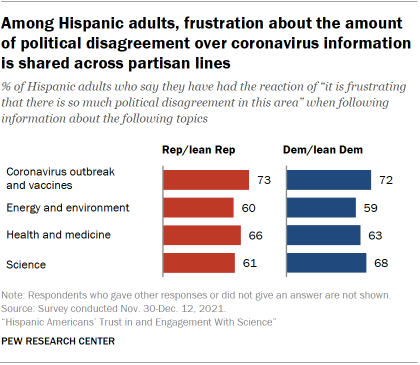
Majorities of Hispanic adults also say it’s frustrating to see so much political disagreement in the other science-related topics covered in the survey: 63% say this about science information generally, while the same share (63%) says this about health and medical information and 57% say this about information regarding energy and the environment.
The sense of frustration about political disagreement in science topic areas is generally shared by Hispanics who align with each of the major parties in the U.S.
A majority of Hispanic adults heard about community events related to COVID-19 over past year
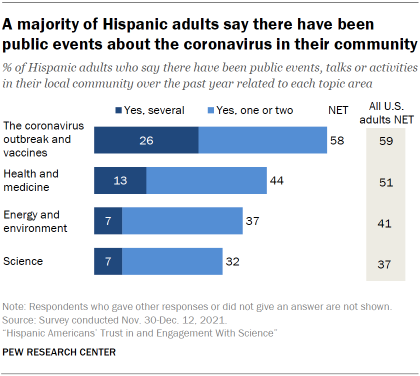
A majority (58%) of Hispanic adults say that there has been at least one public event related to the coronavirus outbreak and vaccines in their local community over the past year. A similar share of all U.S. adults (59%) say there have been events related to the coronavirus outbreak and vaccines in their local community.
Compared to coronavirus-related events, Hispanic adults are less likely to say there have been public events, talks or activities related to health and medicine (44%) or energy and the environment (37%).
Only about a third of Hispanic adults (32%) say there have been public activities or events about science generally in their local community over the past year.
In Their Own Words: Recommendations for Increasing Engagement in Hispanic American Communities
Focus group participants had a range of advice for those wanting to increase science engagement among Hispanic Americans. Many talked about the need to integrate science into family and community life and encouraged those in the science community to start a dialogue, to show their interest in Hispanic communities and to show their trustworthiness.
“I think there needs to be a more open dialogue, I think just between people who are part of that community, whether they’re part of the Hispanic community or whether they’re part of the science or medicine field, about really what intentions are for people of your community and what we’re trying to do just to help you … There should just be more of an open, honest dialogue between the communities.” – Latina, age 25-39
“And then having a person who’s bilingual instead of having an interpreter is easier, and it creates more comfort. And they’re more likely to show up if they know. Or maybe if that person talks to another important community leader in that town, then that leader could kind of spread the word and bring more people in. You could also talk to a lot at churches and have a talk after meetings or after their service, or have a date there and then tell the priest, “Hey invite them or come talk to them.“” – Latina, age 25-39
“I think our leaders from our community should go be out there. In the Hispanic community, more Hispanic leaders to go out and educate and communicate. And make them feel safe. Hey, it’s okay. If you need something, we’re here. We’re not here because of this, we’re here for this. But education and leadership to be out there.” – Latina, age 40-65
Several participants talked about the importance of representation to build trust and interest in science over the lifespan.
“More of us. We need to see more of our people.” – Latino, age 25-39“Just that, incorporate more Latino people in it, starting with school, involve kids in technology and science, and develop more projects about strategies, those type of things, for the kids to get more interested and see it more like a game and therefore begin to have a love for science.” – Latina, age 40-65
Interest in following science news ranks high compared with other news topics; 24%of Hispanic Americans are very interested in science news
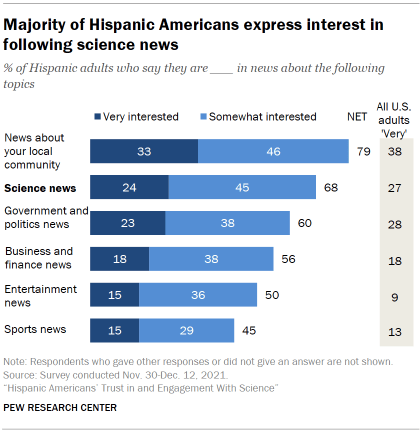
Nearly seven-in-ten Hispanic adults say they are either very (24%) or somewhat (45%) interested in following science news. Interest in science news ranks high on a list of topics included in the survey, trailing only interest in local community news (79% very or somewhat interested).
A larger share of Hispanic adults say they are at least somewhat interested in science news than say this about government and politics news (60%) and business and finance news (56%), as well as news about entertainment and sports.
A 2017 survey found a roughly similar share of Hispanic Americans expressing interest in science news; 26% said they were very interested in following science news.
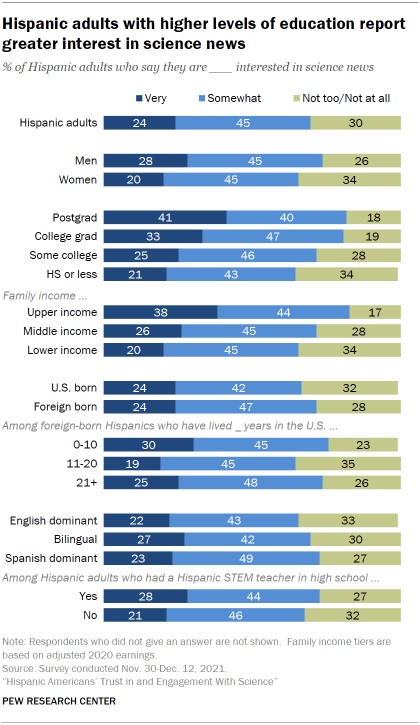
Hispanic adults with higher levels of education express greater interest in science news than those with lower levels of education. For instance, 41% of those with a postgraduate degree say they are very interested in science news, compared with 21% of those with a high school diploma or less education.
A somewhat larger share of Hispanic men than women say they are very interested in following science news (28% to 20%). These same patterns by education and gender in science news interest are also seen among all U.S. adults.
Hispanic adults who say they had a Hispanic science, technology, engineering or math teacher in high school are 7 percentage points more likely than those who did not to say they are very interested in science news (28% t0 21%). The survey design cannot speak to whether having a Hispanic STEM teacher plays a causal role in Hispanic adults’ interest in science news.




